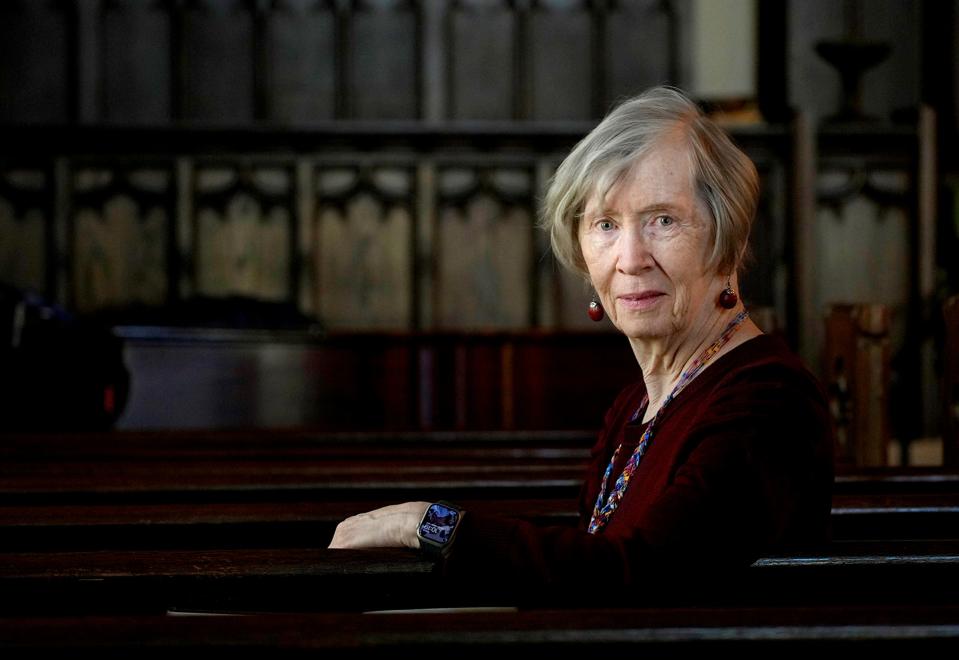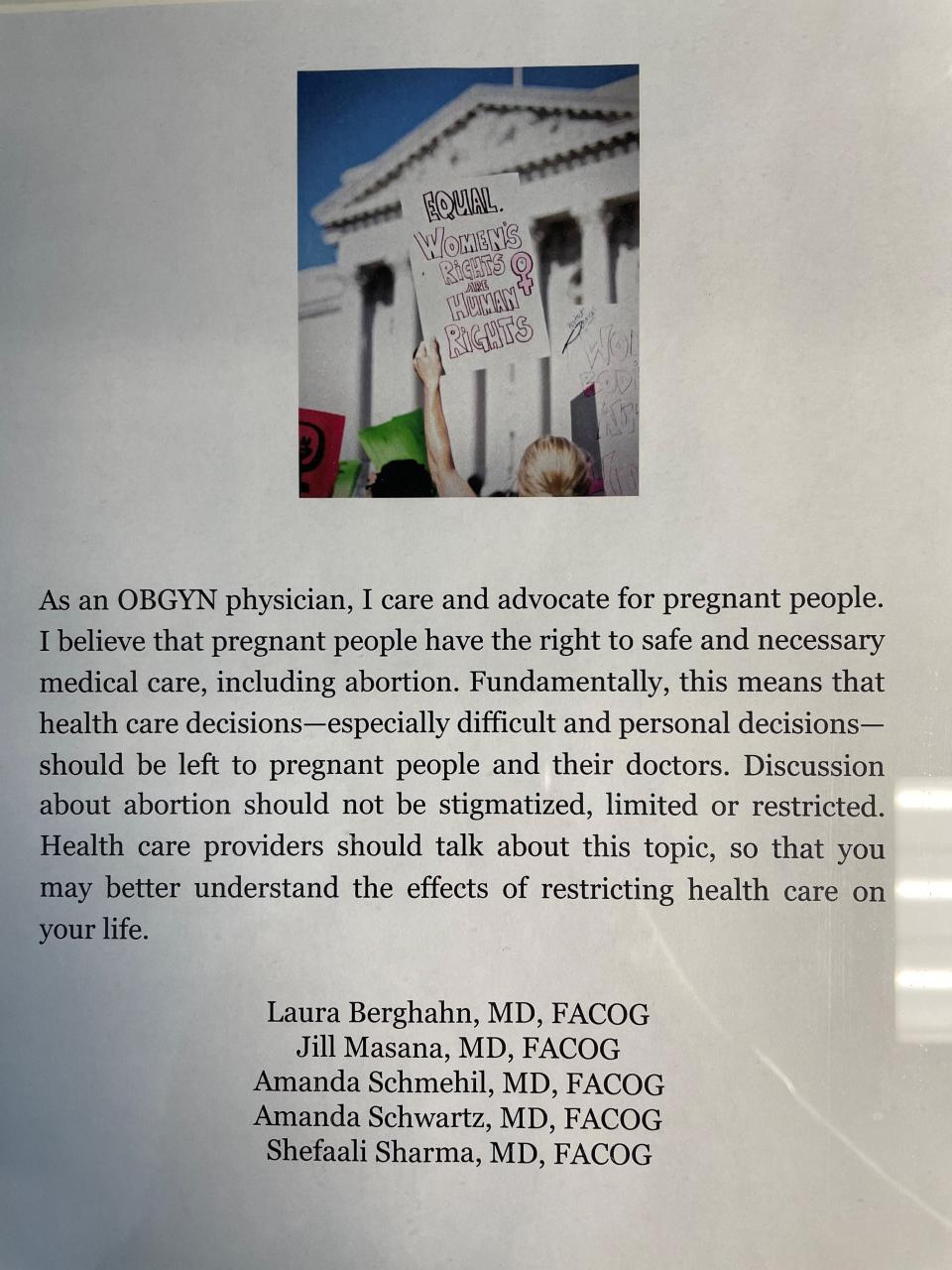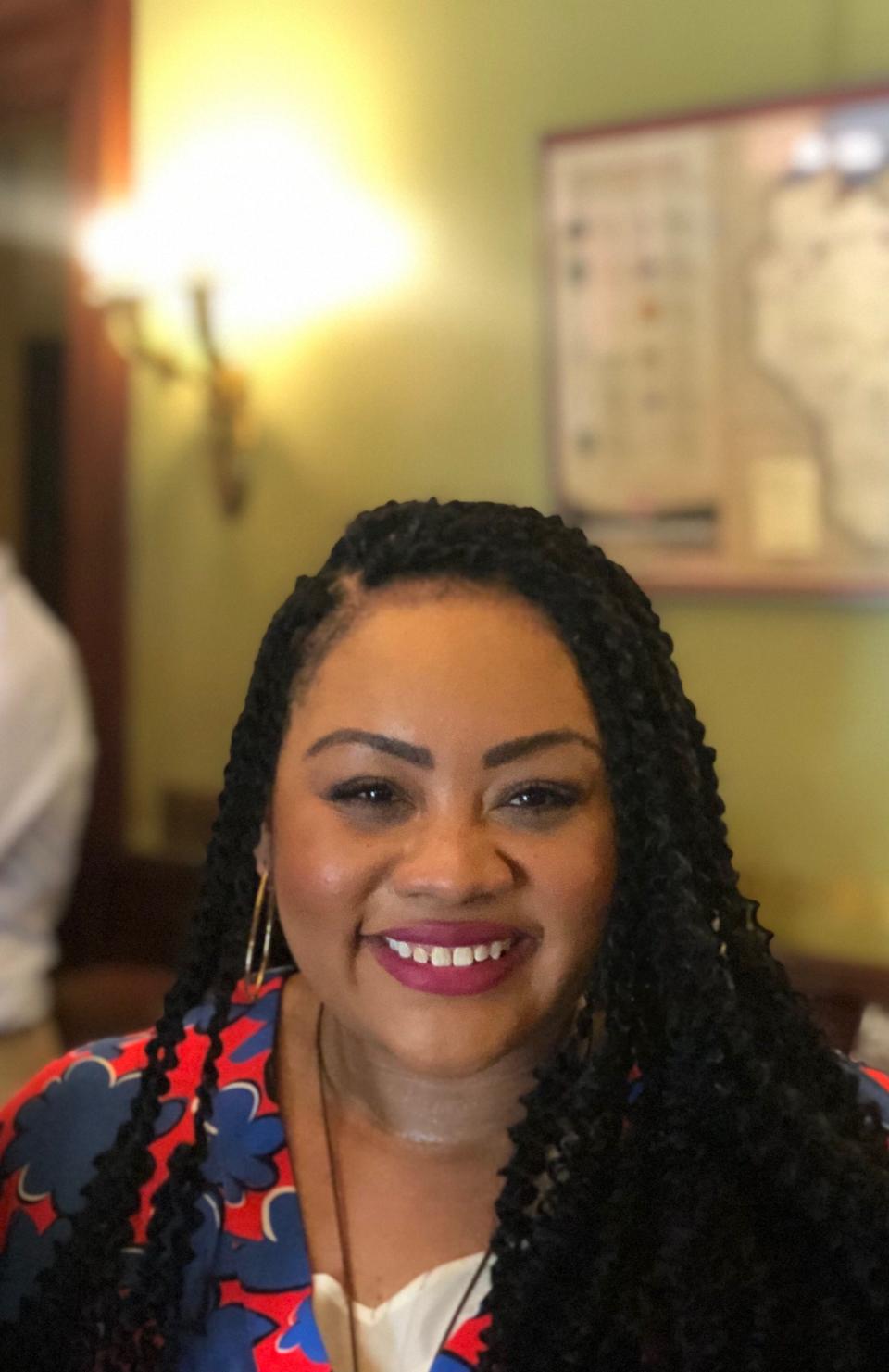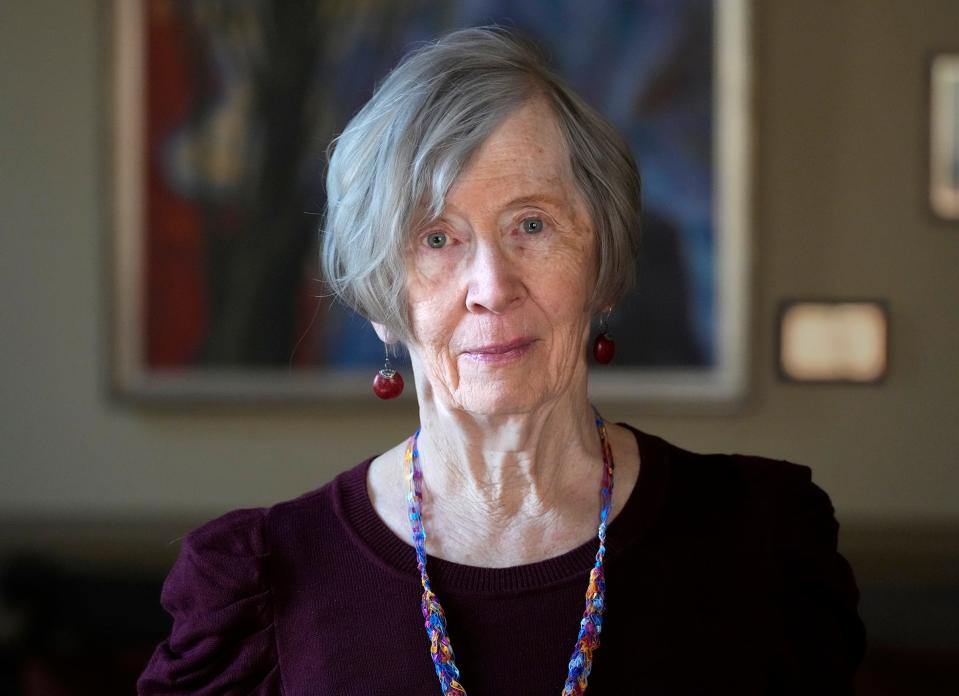For health workers, Wisconsin Supreme Court race wasn't about politics. It was about basic care.
About a year ago, after the leaked draft U.S. Supreme Court decision to overturn Roe v. Wade, Patricia McFarland, 74, sat in a meeting of a small community action group, a question hanging in the air.
Worried about the future of abortion access in Wisconsin, one of her fellow members of PerSisters ― a Wauwatosa group of civic-minded women ― had disclosed the story of her abortion. Did anyone else have a similar story to share, she asked.
No one had ever asked McFarland this before. For the first time in more than 50 years, she opened up.
On April 1, 1970, six weeks pregnant and alone, McFarland arrived at a clinic in Mexico City. Her birth control had failed. Her boyfriend in Madison had dismissed the possibility of marriage; law school was his priority. Regardless, McFarland didn't want to force a marriage or start a family this way.
At the time, terminating a pregnancy was not easy. Abortion was illegal in Wisconsin; Roe v. Wade was still three years away.
McFarland had her little sister take her to O'Hare International Airport. Only when they got there, she asked to be dropped off at the international departures gate.

At the abortion clinic, held tightly in place by staff members during the procedure, she fainted. For a moment, she felt like she was looking down on herself from outside of her body. Doctors told her she had experienced excessive bleeding, and that she needed to get to the university hospital as soon as she got back to Madison.
Her recovery was slow. She worried if she'd ever be able to have kids in the future. But ultimately she moved on with her life. Got married. Had two kids. Dedicated her career to helping babies by teaching child development at Milwaukee Area Technical College.
McFarland drew much of her strength from her mother. Her father had died suddenly at 39, leaving her mother to raise five kids on her own. McFarland called it "rugged individualism." Her mother fought for equal pay and treatment for women in the workplace, and McFarland tried to honor her in everything she did.
But she could never tell her mother, a devout Catholic, about her abortion. Her shame, and the fear of being a disappointment, silenced her.
McFarland watched Roe v. Wade change the law of the land. And then, last year, as she watched the state revert to a near-total abortion ban, she thought of the women of her generation who were forced to go to dangerous lengths to access abortions.
"Women who died, who don't have a voice and can't say to their friends and family: 'Fix this. Have mercy. Look what I went through because somebody made a rule in 1849. They made a rule back then, and it cost me my fertility. Or my life. My health. My future. It cost me relationships,'" she said.
The power of women talking in groups large and small
As battles over abortion access have raged on the political stage, McFarland is one of many in the state who have worked to normalize the conversation about abortion, not as an issue of party or religion, but one of health care.
There is broad public support for abortion access in Wisconsin, and leading medical experts and organizations agree that it is a standard part of the full-spectrum of reproductive care for women.
Women who have had abortions are overcoming societal shame to tell their stories, not just at rallies and in the press but also in intimate social groups and quiet living rooms. Doctors and maternal health experts are reluctantly entering the fray, speaking out against government decisions that they say threaten the people they serve.
On April 4, Wisconsin voters elected liberal Janet Protasiewicz in a race that served as a referendum on the U.S. Supreme Court’s decision to overturn Roe v. Wade. The race shattered national spending records and attracted a level of political warfare unseen before in a state judicial race. Contrary to long-held notions of the need for judicial candidates to stay out of politics, Protasiewicz was open about her support for abortion rights. She won the race by double-digits.
In the wake of that outcome, the women, doctors and health advocates who argued for this outcome expressed relief, while also acknowledging the long path ahead in their mission to restore basic reproductive health care access in Wisconsin.
“Now we have the opportunity to bring Wisconsin back into 2023,” said Shefaali Sharma, a Madison-based OB-GYN. “I am hopeful we can move ourselves forward for a better future.”
Madison OB-GYNs advocate for patients
Sharma is one of five OB-GYNs at a private practice in Madison.
The 1849 ban under which Wisconsin currently operates specifically targets doctors. Physicians who perform abortions can be charged with a felony, and face up to six years in prison and $10,000 in fines. The only exception to the ban is if the abortion is necessary to save the life of the mother.
Since abortion access was restricted in Wisconsin, she and her colleagues have focused on supporting patients to the degree they can.

They put up posters with a joint statement asserting that abortion is health care, hoping to send a clear message. They made sure women knew the exam room was a safe space to talk through all their questions and worries.
The most immediate impact they experienced was "skyrocketing" demand for intrauterine devices, or IUDs. Patients wanted control over their bodies.
“Then they had autonomy over their bodies for the next 8-10 years,” Sharma said of the protection against pregnancies provided by IUDs. “And no one needs to know.”
Typically, the clinic has a week or two wait time for birth control appointments, but they worked to get people in as early as the next day. To accommodate the calls, Sharma said, the team often worked through lunch.
She had been “sweaty, anxious and on-edge” in the final days leading up to election day. She wondered if she had talked to enough people, raised enough awareness, just done enough overall regarding the abortion issue.
“I think this is the most optimistic I’ve been about women’s health in Wisconsin in a long time,” she said the night the election results were announced.
As her profession was attacked, Door County OB-GYN kept working on the front line
At Door County Medical Center, the election result was like “a light at the end of the tunnel” for Dr. Elizabeth Gaida. Watching anti-abortion political ads on TV day after day felt like repeated attacks on what used to be a standard part of her practice as an OB-GYN.
The 1849 law made a difficult job even more challenging, Gaida said. She was already dealing with being on the front lines of the state's ongoing rural doctor shortage.
“We’re in Door County, which is where everyone wants to live,” Gaida said. “But in rural towns, there's a doctor shortage and it's only getting worse. Threatening legal action to physicians for going to work every day does not make that better.”
The Women’s Center of Door County Medical Center, where Gaida is a partner, has been struggling to recruit another full-time partner for more than a year. Gaida noticed a “dramatic” drop in the caliber and quality of applications coming in the months since Roe was overturned.
It seemed the best applicants did not want to come to states that did not allow the full range of OB-GYN care.
That was particularly ominous in a state where one in three Wisconsin counties have no OB-GYN providers, according to UW Health. The OB-GYN shortage has limited labor and delivery services, particularly in rural areas. Eleven hospitals closed their labor and delivery units between 2009 and 2019, according to a report from the Wisconsin Office of Rural Health.
More: In a post-Roe world, some medical students rethink plans to practice in Wisconsin
In the last year, two health systems announced more unit closures. Mayo Clinic announced it would be ending labor and delivery services at its two hospitals in Barron and Menomonie, citing a shortage of OB-GYNs. Ascension St. Francis Hospital stopped delivering babies in December.
It’s become a real concern for Gaida.
“Hopefully they can solve this and make some protections that are a little bit more safe," she said. "Hopefully, they're not just one election away from being overturned again.”
Still, she said she slept better after Protaciewicz's election than she had in months.
“There's hope and it feels like brighter days are ahead for obstetricians and women seeking pregnancy related care in this state," she said.
Birth worker elevates the voices of Black women
For Micaela Berry-Smith, program manager for maternal and child health initiatives at the Madison-based Foundation for Black Women's Wellness, this election was about women being able to decide what is best for them.
When Wisconsin's abortion ban took effect, the foundation stepped in because of its focus on supporting Black birthing people, who are three times more likely than white women to die of pregnancy-related issues, according to the Population Reference Bureau.
"When we think about abortion, a lot of times people think of a Black woman," Berry-Smith said. "They think of the 'welfare queen.' The stereotype of: This woman is just having as many babies as possible so that she can continue to stay on welfare. And then when she's done, she just continues to have all these abortions. It's a myth. It's not the truth."

The truth, Berry-Smith said, is that the issues women face when it comes to the question of having a child are more acute in Black women. Numerous statistics shed light on pregnancy complications related to racism in health care.
But Berry-Smith worries particularly about perinatal maternal homicide. Pregnant people who are living in a dangerous situations need choice, she said.
"You have to weigh: What is the better outcome? If an abortion can happen and this pregnant person can keep their life, then shouldn't we be able to give them that option?" she said.
Leading research has found that instances of physical violence from the man involved in a pregnancy decreased for women who were able to obtain an abortion, but not for those who were turned away from obtaining a wanted abortion.
More: Milwaukee's free doula program hopes to empower women, lessen race-based health challenges
"In this last year, it became even more imperative for birth workers and doulas and those who are in the maternal and child health field to really speak up, because we're out here in the community, we're giving the services and we're seeing what is needed," Berry-Smith said. "If we're advocating in the clinics and in the hospitals, why would we not advocate at the Capitol and lobby for our clients and the families that we serve?"
The Foundation for Black Women's Wellness was at the press conference where Evers first called on the legislature to overturn the 1849 ban.
And some of the foundation's doulas have even traveled out of state to support clients who want an abortion. Doulas are non-medically trained professionals who provide emotional and educational support to pregnant people during and after their pregnancy.
Berry-Smith sees it as her responsibility to "fight for those who really don't know how to navigate the political system, but also to help politicians see the faces behind the items that they are talking and debating about."
She comes from a very religious family, went to Christian school, and many of her friends and loved ones have conservative views on abortion. But she challenges those people in her life to think abortion from a societal perspective, one in which not everyone shares the same views or religion.
She said Evers' re-election and now Protasiewicz's win have given her hope that things might change.
"Really everything I do, I do for my children," she said. "I want them to live in a society where this isn't even a conversation."
All eyes are on Wisconsin now, but other legal questions loom
Wisconsin's Supreme Court race was watched so closely nationally in part because of what it could mean for the future of abortion access in the state.
But even if the state Supreme Court's new liberal majority overturns the ban, what will replace it remains uncertain. And Wisconsin does not exist in a vacuum.
“Yes, all eyes were on Wisconsin, but they're also on these federal court cases, specifically the one in Texas," said Laurie Sobel, associate director Women’s Health Policy at KFF, also known as the Kaiser Family Foundation.
Sobel was referring to a ruling by a federal judge in Texas last week to suspend the U.S. Food and Drug Administration's 23-year-old approval of mifepristone, a pill used in medication abortions and miscarriage management. That same day, a federal judge in Washington ruled essentially the opposite in a different case that seeks to preserve access to the pills.
Then, late Wednesday, a U.S. Appeals court partially overturned the Texas ruling, saying mifepristone should remain on the market for now, but without several more recent measures to make it more accessible, including sending it through the mail. On Thursday, the Justice Department said it would ask the U.S. Supreme Court for an emergency order to pause any action changing access to the pills.
More: Wisconsin Attorney General Josh Kaul joins challenge to abortion pill ruling
Meanwhile, the case filed by Gov. Tony Evers and Wisconsin Attorney General Josh Kaul to challenge the state's 1849 abortion ban will likely reach the Wisconsin Supreme Court next year. The law was written before women could vote and the fields of obstetrics and gynecology, and even technology like ultrasounds, existed.
For the nine months before this spring's state Supreme Court election, McFarland stood in the cold outside early voting locations, thanking voters and asking them to get three more of their friends to the polls. She pointed confused poll-goers in the right direction and helped alert workers when it looked like someone needed help.
And she did it all, as she had many times before, regardless of who they were voting for.

McFarland was raised by her parents to understand the value of civic engagement. Her father sat on the Jefferson County board, demonstrating to her the power of local leadership.
At 12, she remembers running through her town handing out flyers with her mom in support of John F. Kennedy's presidential run, her big Irish family having moved from their Republican voting record by the prospect of sending a Catholic to the White House for the first time.
"Getting out the vote, voting your values, letting everybody have a voice, and that (idea that) every vote is counted, every voter matters — that's just been part of my life since I was 12," McFarland, 74, said. "I've never missed an election."
McFarland says she plans to keep telling her story and fighting so future generations of women don't have to go through what she did. She wants a better world for her two beloved granddaughters.
"I no longer feel ashamed," she said.
Natalie Eilbert of USA TODAY Network-Wisconsin contributed to this story.
This article originally appeared on Milwaukee Journal Sentinel: OB-GYNs fighting abortion ban react to Wisconsin Supreme Court race

